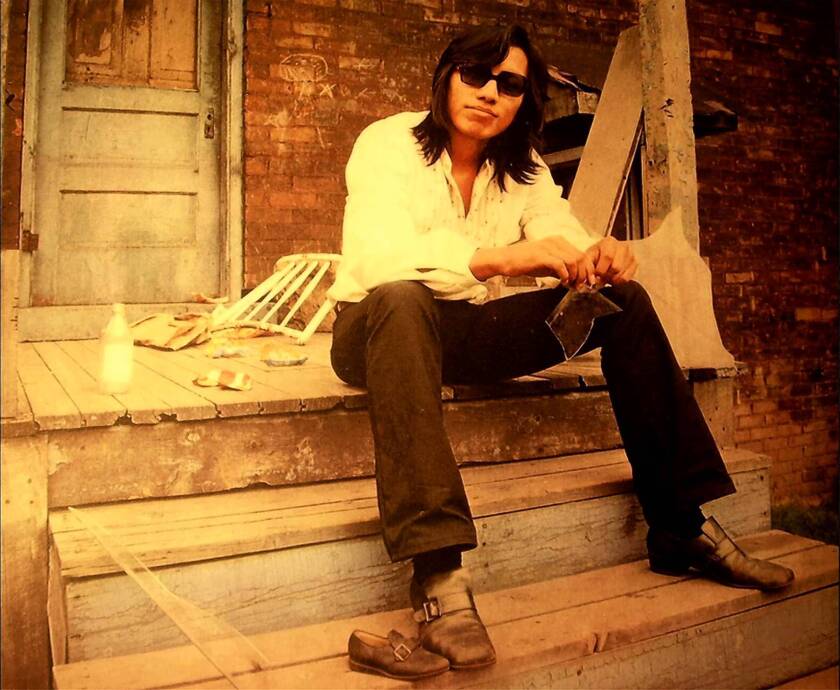Malik Bendjelloul's documentary Searching for Sugar Man is at once an act of musical detective work, a most enjoyable reopening of a dusty Where Are They Now? file, and a disquisition on how a song titled "I Wonder" and steeped in personal and professional uncertainty at the time of its recording could be reclaimed, years later, for magic, dreams, an acceptance that, yes, sometimes good things happen to those who wait. The film's subject is Sixto Rodriguez (a.k.a. Rodriguez), a singer-songwriter who emerged out of Detroit at the turn of the Seventies, releasing a couple of critically acclaimed long-players (1970's "Cold Fact" and 1971's "Coming From Reality") before taking a precipitous nosedive off the radar. Despite major label support, and the input of the best producers on the Motown scene, somehow Rodriguez's pop career never quite caught fire - which made all the more tragic those rumours that arose subsequently, suggesting he'd committed suicide by setting himself alight on stage at the end of a despairing and disastrous final gig.
Publicity stills show Rodriguez to have been a long-haired, mystic guitar-carrier of indeterminate ethnic origin - part Dylan, part Johnny Mathis - with something of the former in his lyrics and vocal styling, though Bendjelloul has gathered the testimonies of contemporaries who assert Rodriguez actually surpassed Dylan in several respects. It was in South Africa where the singer's cause was most passionately taken up, however: here, "Cold Fact", brought into the country by an American tourist and thereafter circulated on bootleg, became a flag for anti-establishment protesters to rally around. (In bringing the spirit of the American heartlands to apartheid-era SA, this is the mirror image of Paul Simon's later "Graceland", itself the subject of a recent documentary, in which an established American artist brought the sound of the shanty town to the US, to wildly successful, a-copy-in-every-home effect.)
It was precisely that element of doubt and ambivalence in Rodriguez's songbook that appealed to this newly emergent protest movement: some indication of how socially clued-in "Cold Fact" was as an album lies in the revelation that not only were its songs banned from radio playlists when it finally received an official release, they were physically scratched out of the album's vinyl by over-zealous censors. This didn't stop a pair of the record's most passionate devotees, Cape Town record store owner Steve "Sugar" Segerman and music journalist Craig Bartholomew-Strydom, from collectively setting out to put the pieces of the Rodriguez puzzle together.
Using animation, talking heads and large, soulful, revealing cuts of Rodriguez's music - I'd wager Badly Drawn Boy had been listening to the singer, and to the track "Street Boy" in particular, before setting out to record "The Hour of Bewilderbeast" - Bendjelloul does a brisk, engaging job of keeping up with these amateur detectives as they follow the money around the backstreets of the recording industry and come, eventually, to join the dots. Their investigation appears to come to a halt in a cul-de-sac that reveals the poor accounting practices of major record labels in the 1970s, but then doubles back with a (probably not unguessable) twist signalled by the wonderfully simple, eloquent and suggestive image of a window being opened.
Yet this would make Searching for Sugar Man sound dryly theoretical, when of course it isn't: it's above all else a human story, about fandom, devotion, earned recognition, and why pop culture matters too much to be left to the likes of Simon Cowell. You can see it in the eyes of Bendjelloul's largely white and middle-aged interviewees, to whom this music, clearly, means something profound indeed - the way dreams and ideas recorded on vinyl will always seem to mean more than the latest One Direction single, downloaded from Amazon. In both the US and UK, Rodriguez remains a virtual unknown, selling precious few records on any format; this is the film that will change all that.
Searching for Sugar Man opens in selected cinemas from tomorrow.

No comments:
Post a Comment